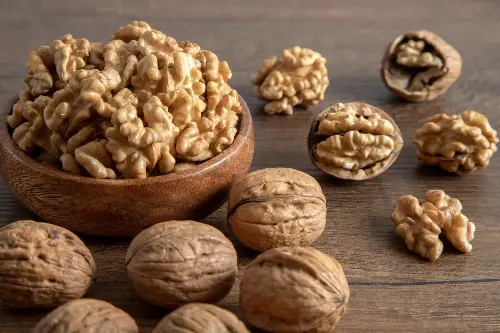Walnuts, with their rich, earthy flavour and distinctive wrinkled appearance, stand out in the nut world not simply for their taste but also for their remarkable health benefits. Nestled within their hard shells is a powerhouse of nutrients. Rich in antioxidants and a prime plant-based source of omega-3 fatty acids, walnuts are a true superfood.

A single walnut contains a potent mix of proteins, healthy fats, fibres, plant sterols, and several vitamins and minerals, including B vitamins, vitamin E, and magnesium. It's no surprise that such a nutritional profile can have a significant impact on overall health.
Health Benefits That Set Walnuts Apart
The regular incorporation of walnuts into one's diet can have vast and varied health benefits. One of the more impressive feats of this nut is its ability to support heart health. Walnuts are full of monounsaturated and polyunsaturated fatty acids, which have been shown to reduce LDL (bad) cholesterol levels and lower the risk of cardiovascular diseases.
Moreover, the high presence of antioxidants in walnuts, such as the polyphenol ellagitannins, help fight oxidative stress and inflammation, two villains that if left unchecked, contribute to chronic diseases. Research indicates that the anti-inflammatory properties of walnuts may also provide relief to those with arthritis or other inflammatory diseases.
For individuals concerned with brain health and cognitive function, walnuts offer hope. They contain neuroprotective compounds, such as vitamin E, folate, and melatonin. Studies have suggested that the omega-3 content, in addition to these compounds, may improve brain function and possibly reduce the risk of age-related cognitive decline.

Walnuts in Weight Management and Disease Prevention
Despite being calorie-dense, walnuts can be a valuable tool in weight management. With their high fibre and protein content, walnuts are filling, which can reduce appetite and help avoid excessive snacking. Evidence from population studies suggests that walnut consumption does not contribute to weight gain when eaten in moderation, and may even aid in weight loss as part of a healthy diet.
Furthermore, emerging studies hint at walnuts' role in cancer prevention. The compounds they contain might help reduce the risk of certain cancers, including breast and prostate cancer, by affecting pathways related to cell growth and repair.

The Versatility of Walnuts in the Kitchen
The robust flavour and satisfying crunch of walnuts make them the perfect addition to a myriad of recipes. Their use in baked goods is perhaps the most well-known; their earthiness adds depth to cakes, bread and cookies. However, the culinary applications of walnuts extend far beyond just desserts.
For a nutrient-packed start to the day, sprinkling chopped walnuts over yoghurt, oatmeal, or cereal can enhance texture and nutritional value. In savoury dishes, they can be ground as a base for vegan burgers or meatless meatballs, offering a meaty texture without the meat. Walnuts can also be toasted and tossed into salads for an added crunch that brings contrast to leafy greens.
Let’s not forget the potential of walnuts in the form of walnut oil, which lends a nutty flavour to vinaigrettes and can be a base for pesto and other sauces. Walnut butter is another versatile alternative, serving as a spread on toast or as a dip for fruits and vegetables.

Incorporating Walnuts into Your Daily Diet
With walnuts' varied health benefits and wide-ranging culinary uses, incorporating them into your diet can be both simple and delicious. Eating them raw or roasted as a snack is a great way to start. Remember that walnut consumption should be moderate due to their high-calorie content—an ounce a day is generally recommended.
For those looking to get more creative, crushing walnuts and adding them to your pancake or waffle batter can provide a delightful texture and flavour. Or, for a savoury twist, mix walnuts into a homemade cheese spread to accompany crackers or vegetable sticks.
Remember, while walnuts are gluten-free naturally, those with nut allergies should find alternative sources of the nutrients walnuts provide.

Sustainability and Walnut Consumption
Today, sustainability is as crucial as nutrition to many consumers. Walnut trees are a high-yield and renewable crop, making them relatively sustainable. By supporting brands and growers that commit to eco-friendly practices, we can enjoy the benefits of walnuts without a heavy environmental impact.
The convergence of walnuts' health benefits and their culinary flexibility makes them an intriguing addition to anyone’s diet. They not only cater to the palate with their unique taste and texture but provide protective properties that contribute to a healthier life. Whether you incorporate them into your snacks, desserts, or main courses, walnuts are a superfood that promises both nutrition and indulgence in every bite.
